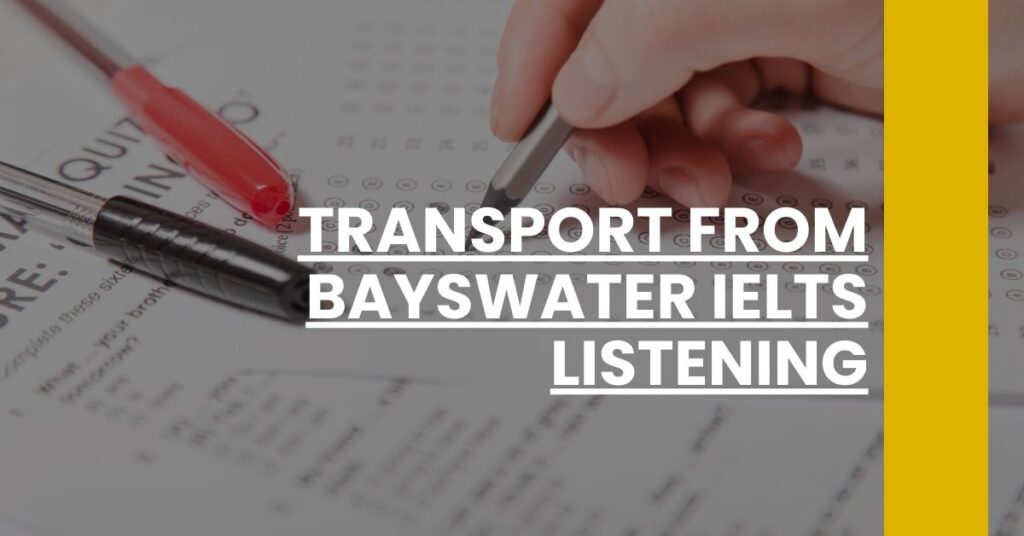Navigating transport options from Bayswater for the IELTS Listening test can be daunting, but with the right strategies, you can pinpoint the correct answers efficiently. This article zeroes in on:
- Differentiating between various modes of transportation discussed in audio clips
- Identifying key details such as bus schedules, train lines, and stops with precision
Know what to listen for, and where to focus your attention to ace the transport questions, leaving you confident and ready to tackle this section of the exam. Armed with practical tips and actionable insights, you’re set to excel in the IELTS Listening component.
- Introduction
- Understanding the IELTS Listening Section
- Common Transport-Related Questions in IELTS Listening
- The Bayswater Context: Analyzing Potential IELTS Questions
- Tips for Mastering Transport Questions in IELTS Listening
- Breaking Down Sample IELTS Listening Answers
- Improving Comprehension for Transport Information
- Resources for IELTS Listening Practice: Focus on Transportation
- Preparing for Unexpected Challenges in Listening Answers
- Conclusion
Introduction
Navigating the transport options from Bayswater or similar locales can often appear in the IELTS listening test, challenging your ability to discern details in everyday conversations. This test isn’t just about understanding speech; it’s about picking up on the nuances of language in different contexts. As you prepare for your IELTS test, you may concern yourself with mastering the listening component—especially when it comes to specific scenarios like transportation. This task can seem daunting, but with the right approach, you can excel.
In this article, you’ll discover strategies and insights that will aid not only in answering transport-from-Bayswater-type questions but also in enhancing your overall listening abilities for the IELTS exam. Equip yourself with these tips, and you’ll navigate through any listening task with confidence.
Understanding the IELTS Listening Section
The IELTS Listening section tests your ability to understand main ideas, details, and speaker attitudes in four recordings. You’ll encounter a range of accents and topics, including the practical details of transportation choices.
Imagine you’re listening to a conversation about the various transport options from Bayswater. It may seem straightforward, but the key is to listen for specifics—bus numbers, departure times, or ticket prices, each of which could be the answer to a question.
To start, familiarize yourself with the test format through the official IELTS description. Understanding the structure will help you anticipate what’s to come and manage your time efficiently during the test.
Common Transport-Related Questions in IELTS Listening
Transportation questions in IELTS Listening often revolve around schedules, routes, and guidelines. You’ll need to be proficient in vocabulary related to public transport, cycling, and even walking directions. Terms like ‘commuter train’, ‘platform number’, ‘bike lane’, and ‘pedestrian zone’ should become part of your lexicon. For a comprehensive list of such terminology, check out this in-depth transportation vocabulary guide.
The Bayswater Context: Analyzing Potential IELTS Questions
Bayswater, a bustling area known for its connectivity, serves as a great example to visualize transportation-related IELTS listening questions. Whether it’s a dialogue about the fastest route to a specific destination or an announcement about new cycle-hire options, each detail is a potential listening answer.
Consider this scenario: An announcement describes changes to the Bayswater station layout. As you listen, jot down key changes mentioned—perhaps platform reassignments or altered bus routes—any of which could be vital information for answering questions correctly.
Tips for Mastering Transport Questions in IELTS Listening
- Fine-Tune Your Predictive Skills: Before you hear the audio clip, glance at the questions. Predict what kind of information you might hear and in what context. This foresight helps in capturing relevant answers.
- Highlight Keywords: In questions, underline or highlight keywords around which conversation tends to revolve. In a Bayswater transport scenario, words like ‘timetable’, ‘last train’, or ‘peak hours’ might be crucial.
- Understand Paraphrasing: The IELTS likes to test whether you can pick up on meaning, not just memorized phrases. If a question mentions ‘the final evening service’, the audio might say ‘the last train at night’. Stay alert to synonyms and paraphrasing.
- Practice with Mock Tests: Your best strategy is to practice with as many transport-related listening exercises as possible. Use resources that mimic the test’s format and difficulty, such as those found on BestMyTest IELTS Listening Practice.
As you immerse yourself in practice tests, remember to simulate testing conditions—this means no pausing or replaying the audio. Also, use these practices as opportunities to get familiar with transport from Bayswater and similar travel contexts in the UK, as this will give you an edge in understanding native speaker accents and local terminology.
Your journey to a successful IELTS Listening score is much like planning a trip–prepare well, anticipate the route, and keep your ears open for announcements. Next, we delve into deciphering sample IELTS listening answers, giving you a blueprint for understanding how to extract the right information from your audio sources.
Breaking Down Sample IELTS Listening Answers
It’s one thing to know what you might encounter on the IELTS Listening section regarding transport options from Bayswater, and quite another to understand how to break down the answers you might hear. Let’s take a sample question as an example:
Sample Question:What is the platform number for the next train to Victoria from Bayswater?
As you listen to the audio, you will likely hear several platform numbers mentioned. Your task is to filter out background noise and focus on the specific detail of the ‘next train to Victoria.’
Here is a breakdown of how to approach the sample audio:
- Pre-listening – Before hitting play, skim through the questions. Predict information that might be pertinent to the answer.
- Active listening – As the audio plays, note down the platform numbers you hear. Wait for a phrase that directly refers to ‘the next train to Victoria.’
- Here comes the critical information! – “Attention passengers, the next train to Victoria will be departing from Platform 4 in approximately ten minutes.”
- Cross-checking – Review your notes. You’ve likely jotted down several numbers, but you’re looking for the one directly connected to your question—Platform 4 in this case.
Remember, some details may be there to mislead you, so always make sure they align accurately with the question asked. It’s this discernment that will lead you to the right transport from Bayswater IELTS listening answers.
For additional practice, visit BestMyTest IELTS Listening Practice to gain exposure to similar transport-related scenarios and questions.
Improving Comprehension for Transport Information
Challenges can occur when listening to transport information within the IELTS exam—the names and numbers mentioned can become jumbled in your head as you try to process the fast-paced conversation. Sharpening your focus is key to overcoming this hurdle. Here are some ways to ensure clarity and understanding:
- Familiarize Yourself with Accents: If you’re not used to British accents, practice listening to different varieties (such as those from the London area, like Bayswater) to get attuned to the pronunciation and intonation used.
- Listen for Numbers: Dates, times, and platform numbers tend to be crucial. Pay particular attention to how these are pronounced and the context they’re used in.
- Distinguish Keywords: Transportation dialogues usually involve terms like ‘depart’, ‘arrive’, ‘transfer’, ‘direct’, and ‘connect’. Knowing these keywords can help you identify the critical parts of the conversation.
Practice this skill by exposing yourself to authentic transport announcements or IELTS-style recordings focusing on transportation information.
Resources for IELTS Listening Practice: Focus on Transportation
Now that you’ve got some strategies under your belt, it’s time to put them to the test. To truly excel, you’ll need resources that offer targeted practice.
Here are a couple of resources to bolster your preparation:
- IELTS Official Practice Materials: Utilize the practice materials provided by the creators of the exam to get the most authentic experience possible.
- IELTS Listening Practice on Traffic Jams from BBC: This listening practice specifically targets your ability to understand complex information within the context of traffic and transport.
Set aside time for regular practice using these resources. This repetition will help you become more comfortable with the format and build confidence.
Preparing for Unexpected Challenges in Listening Answers
IELTS Listening can throw a curveball or two. One moment you’re jotting down the transport options from Bayswater, and the next, you’re trying to grasp a speaker’s implication amidst background chatter. Adaptability is your friend here.
What should you do when the audio throws you a curveball?
- Stay Calm: If you miss a bit of information, don’t panic. Keep your focus on the rest of the audio; often, speakers will repeat or rephrase important details.
- Practice Prediction: Try to predict the type of information that may come up. This way, you’re primed to catch details even if presented in an unexpected way.
- Use Context Clues: Pay attention to the context before and after a challenging piece of audio for hints. Often, the surrounding conversation can give you the insight needed to deduce the correct answer.
And remember, practicing with various accents, speeds of speech, and noisy backgrounds can help improve your adaptability to these unexpected challenges.
Conclusion
By now, you’ve been armed with a suite of tactics to help you master the art of identifying transport from Bayswater IELTS listening answers, and related transport scenarios. These skills are valuable not just for the IELTS test but for real-world English understanding as well. The combination of strategic listening, familiarization with different accents, and consistent practice with quality resources will pave the way for your success.
Embrace the journey; with each practice session, you’re not only moving closer to IELTS proficiency but also to a world of opportunities that proficiency affords. Keep your goal in mind, practice persistently, and soon, navigating the transport-centric questions of the IELTS Listening test will be like a familiar journey through your neighborhood in Bayswater — comfortable, well-trodden, and navigated with ease.
Transport from Bayswater IELTS listening answers: Strategies and tips for acing transportation-related questions in your IELTS exam.

